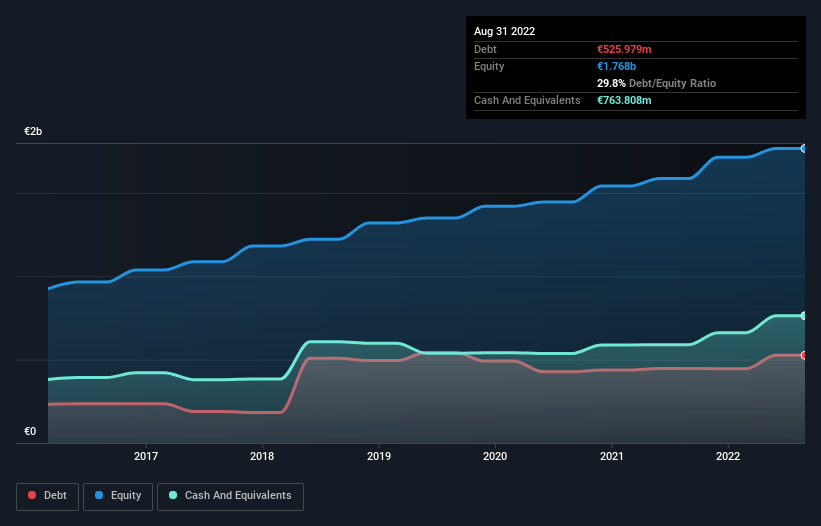Warren Buffett famously said, 'Volatility is far from synonymous with risk.' When we think about how risky a company is, we always like to look at its use of debt, since debt overload can lead to ruin. We can see that L.D.C. S.A. (EPA:LOUP) does use debt in its business. But should shareholders be worried about its use of debt?
When Is Debt A Problem?
Debt assists a business until the business has trouble paying it off, either with new capital or with free cash flow. If things get really bad, the lenders can take control of the business. However, a more frequent (but still costly) occurrence is where a company must issue shares at bargain-basement prices, permanently diluting shareholders, just to shore up its balance sheet. Having said that, the most common situation is where a company manages its debt reasonably well - and to its own advantage. When we think about a company's use of debt, we first look at cash and debt together.
Check out our latest analysis for L.D.C
What Is L.D.C's Net Debt?
You can click the graphic below for the historical numbers, but it shows that as of August 2022 L.D.C had €526.0m of debt, an increase on €446.8m, over one year. However, it does have €763.8m in cash offsetting this, leading to net cash of €237.8m.

A Look At L.D.C's Liabilities
Zooming in on the latest balance sheet data, we can see that L.D.C had liabilities of €1.40b due within 12 months and liabilities of €272.7m due beyond that. On the other hand, it had cash of €763.8m and €652.1m worth of receivables due within a year. So its liabilities total €260.4m more than the combination of its cash and short-term receivables.
Of course, L.D.C has a market capitalization of €1.91b, so these liabilities are probably manageable. Having said that, it's clear that we should continue to monitor its balance sheet, lest it change for the worse. Despite its noteworthy liabilities, L.D.C boasts net cash, so it's fair to say it does not have a heavy debt load!
Fortunately, L.D.C grew its EBIT by 9.9% in the last year, making that debt load look even more manageable. When analysing debt levels, the balance sheet is the obvious place to start. But ultimately the future profitability of the business will decide if L.D.C can strengthen its balance sheet over time. So if you want to see what the professionals think, you might find this free report on analyst profit forecasts to be interesting.
Finally, a company can only pay off debt with cold hard cash, not accounting profits. L.D.C may have net cash on the balance sheet, but it is still interesting to look at how well the business converts its earnings before interest and tax (EBIT) to free cash flow, because that will influence both its need for, and its capacity to manage debt. In the last three years, L.D.C's free cash flow amounted to 48% of its EBIT, less than we'd expect. That weak cash conversion makes it more difficult to handle indebtedness.
Summing Up
Although L.D.C's balance sheet isn't particularly strong, due to the total liabilities, it is clearly positive to see that it has net cash of €237.8m. On top of that, it increased its EBIT by 9.9% in the last twelve months. So we don't have any problem with L.D.C's use of debt. There's no doubt that we learn most about debt from the balance sheet. But ultimately, every company can contain risks that exist outside of the balance sheet. Case in point: We've spotted 1 warning sign for L.D.C you should be aware of.
If you're interested in investing in businesses that can grow profits without the burden of debt, then check out this free list of growing businesses that have net cash on the balance sheet.
New: AI Stock Screener & Alerts
Our new AI Stock Screener scans the market every day to uncover opportunities.
• Dividend Powerhouses (3%+ Yield)
• Undervalued Small Caps with Insider Buying
• High growth Tech and AI Companies
Or build your own from over 50 metrics.
Have feedback on this article? Concerned about the content? Get in touch with us directly. Alternatively, email editorial-team (at) simplywallst.com.
This article by Simply Wall St is general in nature. We provide commentary based on historical data and analyst forecasts only using an unbiased methodology and our articles are not intended to be financial advice. It does not constitute a recommendation to buy or sell any stock, and does not take account of your objectives, or your financial situation. We aim to bring you long-term focused analysis driven by fundamental data. Note that our analysis may not factor in the latest price-sensitive company announcements or qualitative material. Simply Wall St has no position in any stocks mentioned.
About ENXTPA:LOUP
L.D.C
Produces and sells poultry and processed products in France and internationally.
Flawless balance sheet and undervalued.
Market Insights
Community Narratives




